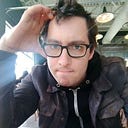Member-only story
FUTURE HUMAN
How Facial Recognition Could Tear Us Apart
Will the new tech create a safer society — or a dystopian panopticon?
 Imagine that you could open an app, while you’re riding on the subway or sitting at a bar, that could tell you everything about everyone sitting around you. Using facial recognition software, it could tap into social networks and databases to show you each person’s name and occupation. It could tell you whether you share mutual friends or common interests. It could even pull up their financial or criminal records. The potential for abuse is so dire, even Microsoft’s president recently called on the government to regulate the technology.
Imagine that you could open an app, while you’re riding on the subway or sitting at a bar, that could tell you everything about everyone sitting around you. Using facial recognition software, it could tap into social networks and databases to show you each person’s name and occupation. It could tell you whether you share mutual friends or common interests. It could even pull up their financial or criminal records. The potential for abuse is so dire, even Microsoft’s president recently called on the government to regulate the technology.
Judith Donath, a social technology researcher who has spent decades studying online culture at MIT and Harvard, believes this sort of advanced facial recognition technology is inevitable. But whether it turns into the ultimate icebreaker or a digital panopticon, she says, is entirely up to us.
This interview has been condensed and edited for clarity.
Medium: In 10 years’ time, where will we be with facial recognition technology?
Judith Donath: I think we’re going to see facial recognition become quite commonplace. If you go on…

